
How to Create an SEO Dashboard: A Step-by-Step Guide
An advanced SEO dashboard is a powerful tool that visually displays key SEO metrics and performance indicators. It offers deeper insights into a website’s search optimization and online visibility, going beyond standard reports. With enhanced analysis, customization, and integration features, it helps users monitor site performance, uncover issues, and optimize their SEO strategy.
Organic search engine visibility remains a cornerstone of any successful digital marketing strategy. However, effectively monitoring and optimizing SEO performance can be a complex undertaking. Marketers face the challenge of sifting through vast amounts of data from various sources, often needing help translating insights into actionable strategies.
This is where a well-constructed SEO dashboard offers a transformative solution. By consolidating key metrics and presenting them in a clear, concise format, an SEO dashboard empowers data-driven decision-making. Imagine a centralized command center providing real-time insights into your website’s health and search engine visibility ,and customer engagement. This lets you identify areas for improvement and track the effectiveness of your SEO efforts over time. The result? A strategic roadmap to optimize your website’s performance and achieve sustainable organic growth.
Key Takeaways
- Selecting an appropriate platform for your SEO dashboard is crucial. Free tools like Google Data Studio offer flexibility and cost-effectiveness. At the same time, paid platforms like SEMrush and Ahrefs provide advanced features and deeper insights.
- Establish specific SEO goals and identify key performance indicators (KPIs) to focus your dashboard on the most relevant metrics. This ensures that your dashboard provides actionable insights aligned with your business objectives.
- Automate data updates and regularly review your dashboard to maintain data accuracy and relevance, enhancing the customer experience. Frequent checks help identify trends, address issues promptly, and refine your SEO strategy based on the latest information.
- Tailor your dashboard to meet the needs of different stakeholders. Use clear visualizations and prioritize essential metrics. Customization ensures the dashboard effectively communicates insights to various team members and decision-makers.
Choosing Your Platform
When creating an SEO dashboard, selecting the right platform is crucial. Here are some options to consider:
- Free Tools:
- Paid SEO Platforms:
- Ease of Use:
- Features:
- Budget:
Google Data Studio Google Data Studio is a popular choice for many marketers due to its versatility and cost-effectiveness. This free tool allows you to create customizable and interactive dashboards by connecting to various data sources like Google Analytics, Google Search Console, and more, making it particularly useful for tracking advertising campaign performance With a user-friendly interface and extensive community support, Google Data Studio is ideal for those looking for a budget-friendly option without compromising features.
SEMrush and Ahrefs For more advanced needs, paid platforms like SEMrush and Ahrefs offer built-in dashboards that provide comprehensive SEO insights., streamlining the business process of tracking and analyzing SEO performance. These tools track a wide range of SEO metrics and offer additional features like keyword research, backlink analysis, and competitor analysis. While these platforms come with a higher price tag, they are worth considering for their robust capabilities and depth of data.
Factors to Consider
Choose a platform that matches your technical proficiency. Google Data Studio, for instance, has a gentler learning curve, whereas SEMrush and Ahrefs may require more time to master.
Evaluate the specific features each platform offers. If you need in-depth keyword and backlink analysis, a paid tool like Ahrefs or SEMrush might be more suitable.
Consider your budget constraints. Free tools like Google Data Studio provide substantial capabilities at no cost, making them an excellent starting point. Paid platforms, while more expensive, can offer more comprehensive insights and additional functionalities that might justify the investment.
Step-by-Step Guide to Creating an SEO Dashboard
Creating an effective SEO dashboard starts with knowing what matters most. Begin by identifying the key performance indicators (KPIs) you want to track, then connect the right data sources—like Google Analytics, Search Console, or your SEO tools. Choose a reporting platform that fits your workflow, and customize the dashboard so it clearly shows metrics like keyword rankings, organic traffic, and backlinks. Most importantly, keep it updated regularly and tailor it to what your team or stakeholders actually care about. Creating an SEO dashboard involves several crucial steps to ensure it effectively tracks and displays your SEO performance. Here’s a detailed guide:
Determine Your Objectives
- Identify Key SEO Goals:
- Understand Important Metrics:
- Identify Essential Data Sources:
- Google Data Studio:
- SEMrush/Ahrefs:
Start by clarifying your main SEO objectives, such as increasing organic traffic, improving keyword rankings, enhancing user engagement, or boosting conversion rates. Having clear goals provides valuable insight that helps focus your dashboard on the most relevant metrics.
Define the key performance indicators (KPIs) that align with your goals. Common KPIs include organic traffic, bounce rate, keyword rankings, backlinks, and conversion rates.
Collect and Integrate Data Sources
Determine which data sources you need to integrate into your dashboard. Common sources include Google Analytics, Google Search Console, SEMrush, and Ahrefs.
Integration Process:
Link your data sources using built-in or third-party connectors. This might involve setting up APIs or importing CSV files.
Utilize their native integrations to automatically pull in data, ensuring real-time updates and seamless connectivity.
Select Key Metrics and KPIs
- Organic Traffic:
- Keyword Rankings:
- Backlinks:
- Page Speed Insights:
- Bounce Rate:
- Conversion Rate:
- Click-Through Rate (CTR):
Track the number of visitors arriving via search engines to gauge your SEO effectiveness.
Monitor the positions of your targeted keywords to understand your visibility on search engine results pages (SERPs).
Analyze the quantity and quality of backlinks to assess your link-building efforts and domain authority.
Measure your website’s loading speed to ensure a good user experience and better search rankings.
Evaluate the percentage of visitors who leave your site after viewing only one page to identify areas for engagement improvement.
Assess the percentage of visitors who complete desired actions (e.g., filling out a form or making a purchase) to understand the effectiveness of your SEO strategies.
Measure the ratio of users who click on your links in the search results. This indicates the appeal of your titles and meta descriptions.
Design Your Dashboard Layout
- Clean and Intuitive Design:
- Charts and Graphs:
- Grouping Related Metrics:
Focus on creating a dashboard that is easy to navigate and understand. Utilize data and information visualization techniques to avoid clutter and use a logical arrangement of elements.
Choose the right visualizations for each metric. Line charts are great for trends, bar charts for comparisons, and pie charts for distributions.
Organize related metrics to provide a comprehensive view of specific aspects of your SEO performance.
Customize and Filter Data
- Filters:
- Customization:
To tailor the data view to your needs, add filters for date ranges, geographic regions, devices, and specific pages.
Adjust the appearance and data presentation to align with your branding and objectives.
Automate Data Updates
- Automatic Data Refresh:
Configure your dashboard to refresh data automatically at regular intervals (e.g., daily, weekly) to ensure you always have the most up-to-date information without manual intervention.
Share and Collaborate
- Sharing Options:
- Permissions:
- Collaboration Features:
Share your dashboard with team members and stakeholders using sharing features to enhance team skill and ensure that your brand message is consistently communicated. Ensure that everyone who needs access can view and interact with the data.
Set appropriate access levels to control who can view, edit, or manage the dashboard. This ensures data integrity and security.
Use built-in collaboration tools for data analysis, interpretations, and strategic planning.
Regular Review and Optimization
- Review Frequency:
- Identify Improvement Areas:
- Iterative Changes:
Decide on a regular schedule for reviewing and updating your dashboard.
Use the dashboard’s insights to identify trends, opportunities, and areas needing optimization.
Continuously adjust based on the data insights to refine your SEO strategies and improve performance.
Tools for Monitoring SEO Performance
When monitoring and analyzing SEO performance, having the right tools is essential. Here are some popular tools and software that can help you track and optimize your SEO efforts:
- DiGGrowth:
- SEMrush:
- Ahrefs:
- Moz:
- Google Analytics:
DiGGrowth is a robust SEO and digital marketing platform providing in-depth insights and tracking performance. It offers keyword tracking, backlink analysis, competitor monitoring, and comprehensive reporting , including targeted advertising strategies. DiGGrowth’s intuitive dashboards and real-time data updates help you stay on top of your SEO performance and make data-driven decisions.
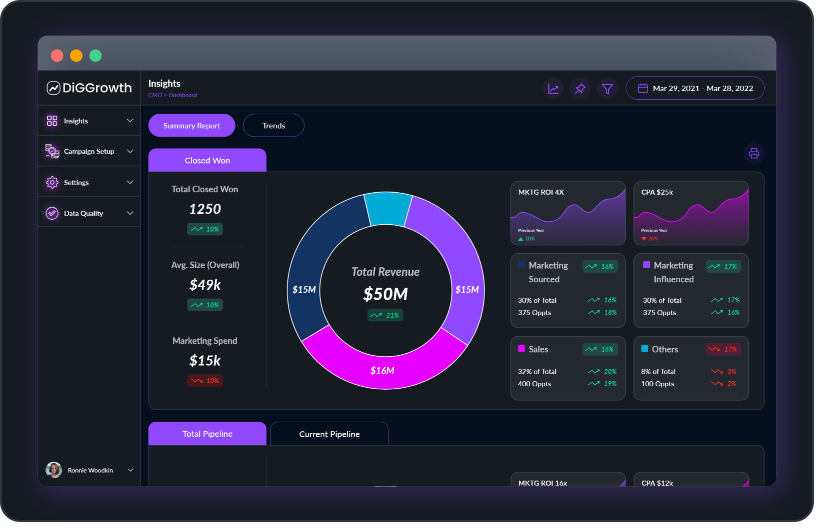
SEMrush is an all-in-one SEO tool offering keyword research, site audit, and competitor analysis features. It helps you identify opportunities for improvement, track your keyword rankings, and analyze your competitors’ strategies, aiding in effective lead generation. SEMrush’s detailed reports and recommendations make optimizing your SEO efforts and enhancing your online presence easier.
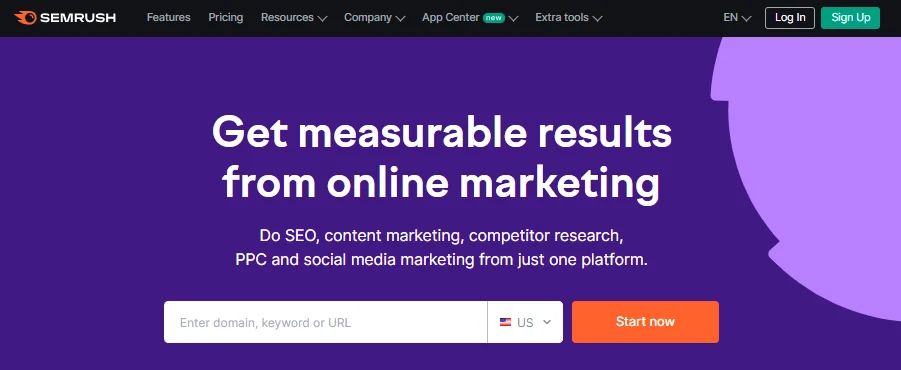
Ahrefs is renowned for its extensive backlink analysis capabilities. It provides insights into your website’s backlink profile, identifies high-quality link-building opportunities, and monitors your competitors’ backlinks. Additionally, Ahrefs offers tools for keyword research, content analysis, and rank tracking, making it a comprehensive solution for SEO monitoring. The probability of improving your search engine rankings increases significantly when leveraging Ahrefs’ robust features.
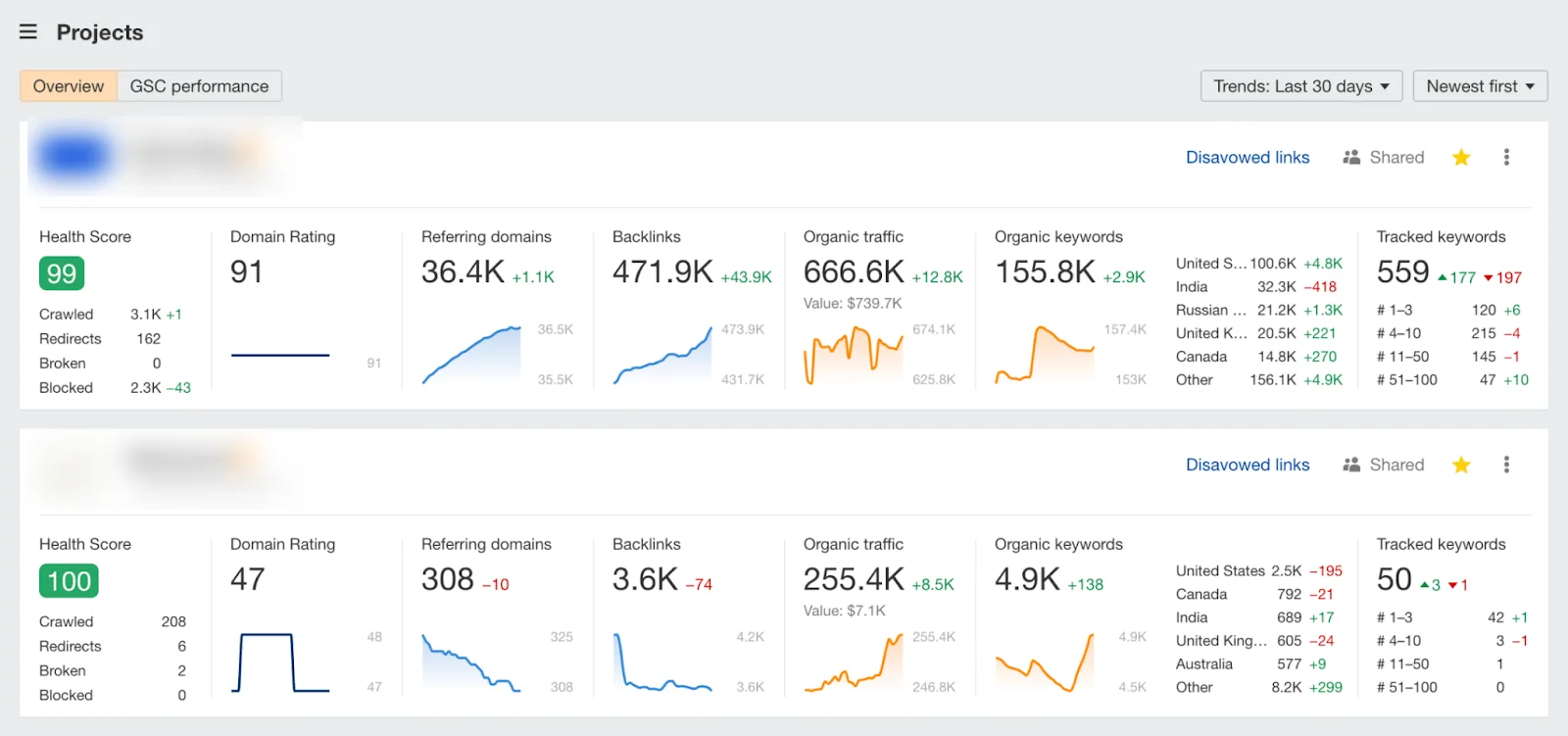
Moz is another popular SEO tool with keyword research, link building, and site optimization features. It also offers insightful metrics such as domain and page authority to help you assess your website’s performance. Moz’s user-friendly interface and actionable recommendations make it a valuable resource for improving your SEO strategy.
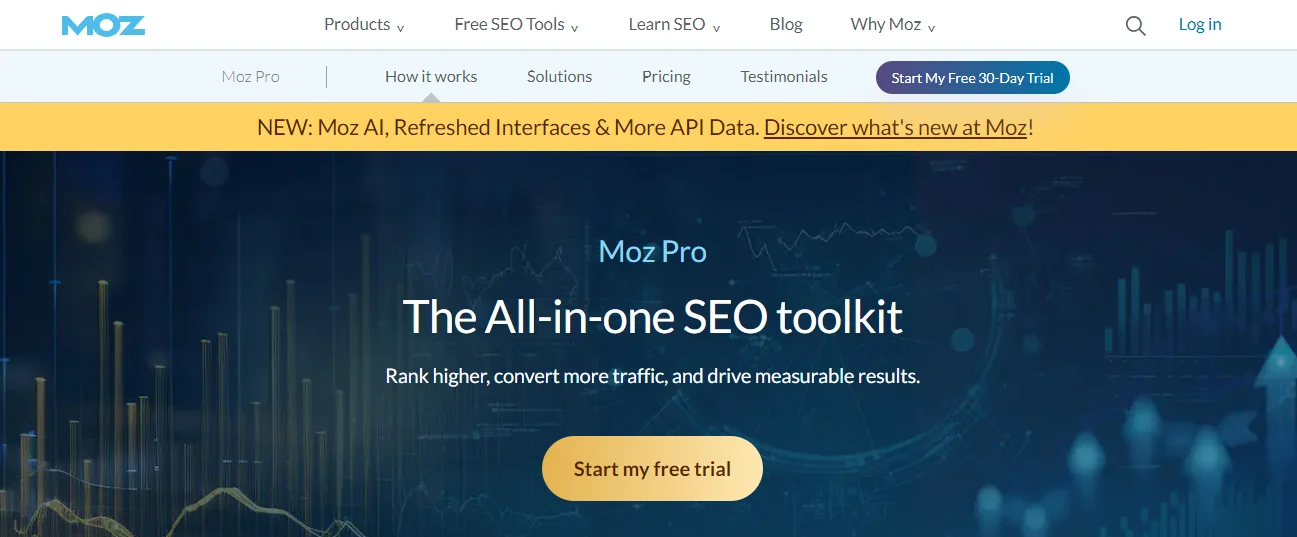
Google Analytics is a powerful tool that provides valuable insights into website traffic, user behavior, and conversions. It allows you to track key metrics such as organic search traffic, bounce, and conversion rates. With its comprehensive data, you can understand how visitors interact with your site and identify areas for improvement. Additionally, analyzing data trends from Google Analytics can be crucial during mergers and acquisitions, as it helps stakeholders assess the online performance and potential value of the business being acquired.
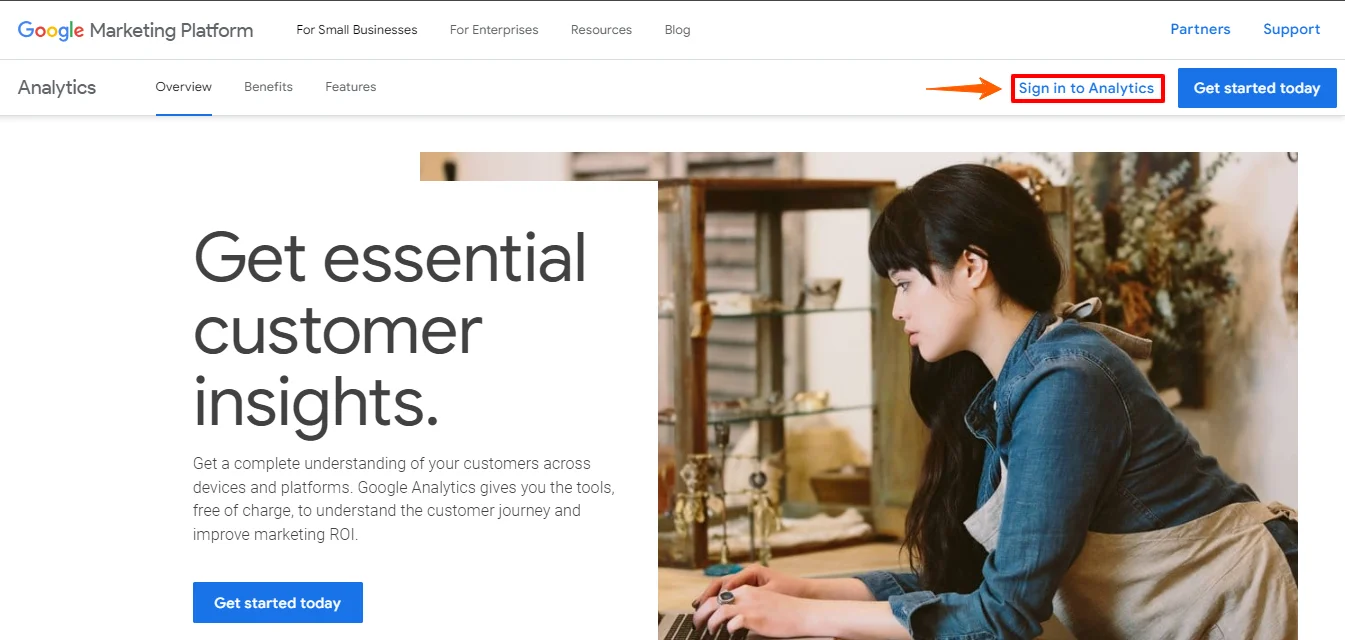
Components of an Effective SEO Dashboard
When creating an SEO dashboard, it’s crucial to include the right components to monitor and analyze your website’s performance effectively.
Visuals
- Use graphs, charts, and images to represent data trends and insights visually.
- Include heatmaps and geographic maps to visualize user behavior and traffic sources.
Data Visualizations
- Display key metrics like organic traffic, bounce rate, and conversions in easy-to-read visual formats.
- Use interactive graphs and timelines to track changes over time and identify patterns.
Customizable Widgets
- Allow users to customize their dashboard with widgets for specific KPIs and metrics.
- Include dropdown menus and filters for easy data manipulation and analysis.
By including these essential components in your SEO dashboard, you can gain valuable insights and make data-driven decisions to improve your website’s search performance.
Best Practices for Analyzing SEO Data
- Set benchmarks:
- Establish goals:
- Track progress:
- Ensure data accuracy:
- Report regularly:
Establishing benchmarks for key metrics is essential for measuring the success of your SEO efforts. Setting realistic goals allows you to track your progress and adjust as needed.
Clearly define your SEO goals and objectives to provide direction for your analysis. Whether your goal is to increase organic traffic, improve keyword rankings, or boost conversions, having a clear focus will help you prioritize your efforts. Understanding your target market also ensures your SEO strategies align with audience needs.
Regularly monitoring and analyzing your SEO data is crucial for identifying areas for improvement and tracking your progress toward your goals. You can make informed decisions to optimize your strategy by reviewing your data consistently.
It’s important to ensure your SEO data is accurate and reliable. Regularly audit your data sources to identify any discrepancies or errors that may impact your analysis. Consistent data tracking is key to making informed decisions based on reliable information.
Reporting your SEO performance is essential for keeping stakeholders accountable. By providing regular updates on key metrics and performance insights, you can demonstrate the impact of your SEO efforts, provide an incentive for improvement, and highlight areas for improvement.
Why Regular Monitoring and Reporting is Essential for SEO Success
Regular monitoring and reporting are crucial components of a successful SEO strategy. By consistently tracking your website’s performance and analyzing key metrics, you can stay on top of trends, identify areas for improvement, and make informed decisions to drive organic traffic and improve search engine rankings.
- Track Progress:
- Identify Issues:
- Make Informed Decisions:
Regular monitoring allows you to track the progress of your SEO efforts over time. By reviewing key performance indicators (KPIs) such as organic traffic, keyword rankings, and conversion rates, you can see how your website performs and make adjustments to meet your goals.
Regularly monitoring your SEO performance helps you quickly identify any issues or roadblocks impacting your search engine rankings. Whether it’s a technical issue, a drop in organic traffic, or a decline in keyword rankings, return on investments, regular monitoring allows you to gain a better understanding of these issues, address these issues promptly and prevent long-term damage to your website’s visibility.
You can make informed decisions about your SEO strategy by analyzing real-time data and performance metrics. Whether adjusting your keyword targeting, optimizing your website for mobile search, or refining your content strategy, regular monitoring and reporting provide the insights you need to make data-driven decisions that drive results.
Pro Tip- Establishing a regular reporting schedule, communicating findings to stakeholders, and adjusting your SEO strategy based on data insights can help you optimize your website for search engines and maximize your online visibility.
Tips for Effective SEO Dashboard Management
Managing an SEO dashboard efficiently is key to maximizing its value and ensuring you derive actionable insights from your data. Here are some tips for effective SEO dashboard management:
Define Clear Objectives
- Set Specific Goals:
- Focus on KPIs:
Establish SEO objectives, such as improving keyword rankings or increasing organic traffic. Align your dashboard metrics with these goals to ensure they provide relevant insights, especially when using Software as a Service (SaaS) platforms that aggregate data from various sources.fr
Identify the most critical Key Performance Indicators (KPIs) that align with your goals, such as organic search traffic, conversion rates, and keyword performance.
Regularly Update Your Data
- Automate Data Refresh:
- Monitor Data Integrity:
Set up your dashboard to automatically refresh data regularly to ensure you’re working with the most current information.
Periodically check for data discrepancies or inaccuracies to maintain the reliability of your insights.
Customize for Your Audience
- Tailor Views:
- Use Clear Visualizations:
Customize the dashboard to meet the needs of different stakeholders. For example, executives might need high-level summaries, while SEO specialists may require detailed metrics.
Choose appropriate charts and graphs that effectively communicate data trends and insights to your audience.
Simplify and Prioritize
- Avoid Clutter:
- Highlight Key Metrics:
Keep the dashboard clean and uncluttered by focusing on essential metrics and avoiding unnecessary details.
Ensure that the most important KPIs are prominently displayed for easy access and quick interpretation.
Leverage Alerts and Notifications
- Set Up Alerts:
- Respond Promptly:
Configure alerts for significant changes or anomalies in your data, such as sudden drops in traffic or changes in keyword rankings.
Act on alerts swiftly to address issues before they escalate and capitalize on opportunities as they arise.
Regularly Review and Adjust
- Schedule Reviews:
- Incorporate Feedback:
Regularly review your dashboard’s performance and relevance. Adjust the metrics and visualizations as needed to reflect changes in your SEO strategy or business goals.
Gather feedback from users regarding digital distribution to make improvements and ensure the dashboard continues to meet their needs effectively.
Ensure Data Accuracy
- Verify Data Sources:
- Audit Data:
Regularly check that all data sources are connected correctly and that the data being pulled is accurate and up-to-date.
Perform periodic audits to identify and correct data inconsistencies or issues.
Use Comparative Analysis
- Benchmark Performance:
- Analyze Competitors:
Compare current data against historical data or industry benchmarks to assess performance trends and identify areas for improvement.
Incorporate competitor data and advertising insights to understand how your SEO performance compares to industry standards and adjust strategies accordingly.
Conclusion
An effective SEO dashboard is essential for tracking and optimizing your website’s performance. By selecting the right platform, defining clear objectives, and incorporating comprehensive tools, you can gain valuable insights into your SEO efforts. Regular updates, customization, and data accuracy are key to leveraging your dashboard’s full potential.
You can enhance your SEO strategy and achieve measurable success with the right tools and strategies.
For personalized assistance in setting up or optimizing your SEO dashboard, contact us at info@diggrowth.com.
Ready to get started?
Increase your marketing ROI by 30% with custom dashboards & reports that present a clear picture of marketing effectiveness
Start Free Trial
Experience Premium Marketing Analytics At Budget-Friendly Pricing.

Learn how you can accurately measure return on marketing investment.
How Predictive AI Will Transform Paid Media Strategy in 2026
Paid media isn’t a channel game anymore, it’s...
Read full post postDon’t Let AI Break Your Brand: What Every CMO Should Know
AI isn’t just another marketing tool. It’s changing...
Read full post postFrom Demos to Deployment: Why MCP Is the Foundation of Agentic AI
A quiet revolution is unfolding in AI. And...
Read full post postFAQ's
When setting up an SEO dashboard, avoid common mistakes, such as overloading it with too many metrics, leading to confusion and clutter. Ensure you use relevant data, and be cautious about not customizing the dashboard for different stakeholders' needs. Review the dashboard to ensure it stays consistent and connected to your SEO goals.
Automation helps streamline data updates and ensures your dashboard displays the most current information. Set up automated data refreshes and alerts to reduce manual effort and respond quickly to changes in your SEO performance.
Advanced features in paid SEO dashboard platforms include: In-depth keyword research tools. Backlink analysis. Competitor tracking. Custom reporting options. Integration with multiple data sources. Look for platforms offering robust analytics capabilities and flexibility to tailor the dashboard to your needs.
User experience is crucial for an effective SEO dashboard. A well-designed dashboard should be intuitive, easy to navigate, and visually appealing. Ensure that it provides clear, actionable insights and is tailored to the needs of its users to facilitate effective decision-making.
Consider including KPIs such as: Cost-per-click (CPC): To understand the cost efficiency of paid search efforts. Session Duration: To gauge user engagement beyond bounce rate. Landing Page Performance: To assess how well specific landing pages perform in driving conversions. Local Search Metrics: For businesses with a local focus, track local search visibility and local rankings.


